Title: The Development of Cryptocurrency in Japan: Challenges and Regulatory Framework
Author: Rick Maeda
Translation: DeepTechFlow
Abstract
Despite early adoption of cryptocurrencies in Japan, the country's development has been rocky due to two major cryptocurrency exchange hacks in its history.
These events forced Japanese regulatory agencies to intervene earlier than in other countries, providing a clear regulatory framework for the industry.
However, strict regulations and high tax rates have made Japan less competitive compared to neighboring countries such as Singapore and Hong Kong.
Facing low trading volumes and a lackluster domestic entrepreneurial environment, Japan encounters numerous challenges in developing its Web3 industry, requiring significant policy reforms to achieve revitalization.
Introduction
Due to the lack of high-yield opportunities and unattractive domestic stock markets, ordinary investors in Japan have long been known for their enthusiasm for leveraged trading. Individual currency traders in Japan have a significant impact on the TRY/JPY (Turkish Lira/Japanese Yen) forex trading pair, and the international financial community even coined the term "Mrs. Watanabe" to represent them. When Bitcoin and other cryptocurrencies entered the mainstream user market in the early 2010s, Japanese day traders enthusiastically embraced this emerging asset class. However, investors quickly faced domestic challenges, including two well-known exchange hacks, combined with Japan's lack of attractiveness in entrepreneurship and investment, leading to the country's declining position in the Web3 field.
In this research article, we will:
Review the history of cryptocurrency in Japan, particularly the development of various regulations.
Analyze Japan's current situation.
Discuss some key participants in the domestic industry.
History of Cryptocurrency in Japan
Japan's cryptocurrency development has experienced many significant events, such as the Mt. Gox and Coincheck hacks, prompting the government to implement strict regulatory measures to protect investors and maintain financial system stability. Japan continues to develop its regulatory framework to address new challenges and opportunities in the cryptocurrency field.
Early Stage and Rise of Mt. Gox
2009:
- Bitcoin, the first cryptocurrency, was introduced by an individual or group using the name Satoshi Nakamoto. During these early stages, awareness and adoption of cryptocurrencies were limited worldwide, including in Japan, despite the creator using a Japanese pseudonym.
2011~2013:
- Mt. Gox, a Bitcoin exchange based in Tokyo, became the world's largest Bitcoin exchange, processing the vast majority of Bitcoin transactions at its peak (Figure 1).
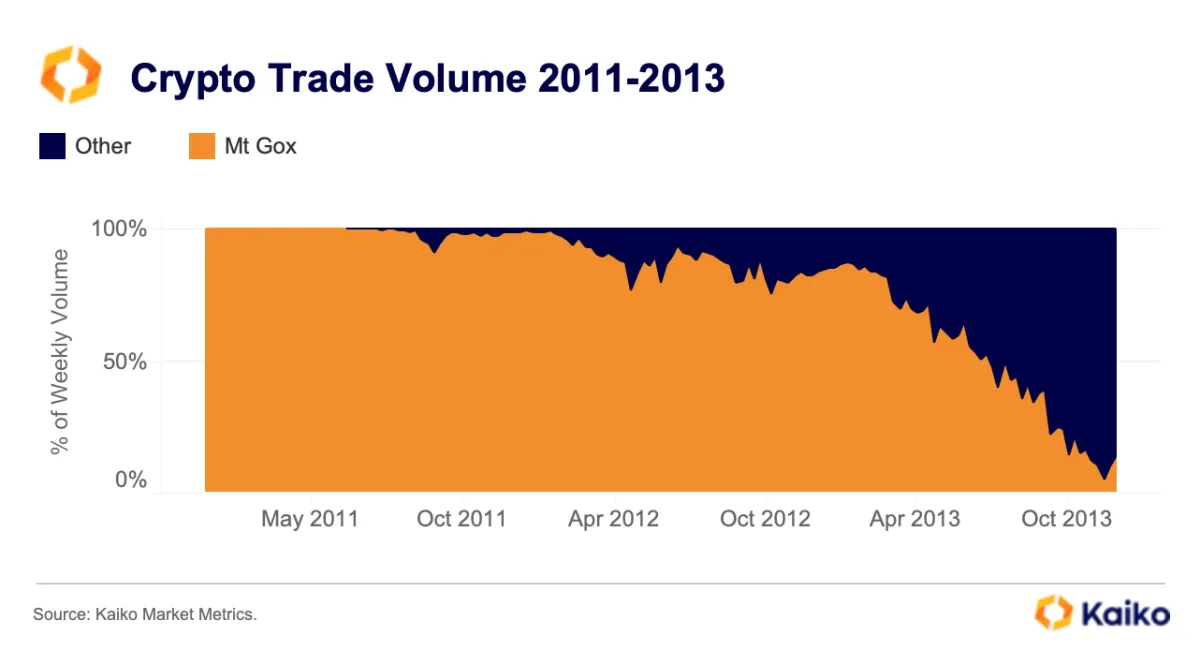
Figure 1: Global CEX trading volume as of the end of 2013
Mt. Gox Hack Event and Its Consequences
2014:
- Mt. Gox suspended trading, shut down its website, and filed for bankruptcy, announcing that approximately 850,000 bitcoins (nearly 7% of all bitcoins at the time, valued at about $450 million) were stolen. Investigations revealed mismanagement and inadequate security measures as the causes of the loss.

Figure 2: Bitcoin price dropped by over 40% within 3 days after Mt. Gox halted withdrawals
Regulatory Development and Early Regulations
2015:
The Financial Action Task Force (FATF), an intergovernmental policy-making body of the Group of Seven (G7), issued guidelines recommending the regulation of virtual currency exchanges by countries to combat money laundering and terrorist financing.
The Japanese government began drafting legislation aimed at regulating exchanges to protect consumers and ensure financial stability.
2016:
The Japanese Cabinet and National Diet passed bills amending the Payment Services Act (PSA) and the Financial Instruments and Exchange Act (FIEA). These amendments recognized virtual currencies (such as Bitcoin, Ethereum, Ripple, Litecoin, and Bitcoin Cash) as a means of payment and imposed regulatory requirements on cryptocurrency exchanges, laying the foundation for the comprehensive implementation of cryptocurrency regulations.
The Financial Services Agency (FSA) was responsible for implementing these regulations, focusing on exchange registration requirements, network security measures, and anti-money laundering (AML) protocols.
Coincheck Hack Event and Strengthened Regulation
2017:
The amended PSA came into effect in April, requiring cryptocurrency exchanges to register with the FSA and comply with AML and Know Your Customer (KYC) regulations. These regulations also classified Bitcoin as a prepaid payment instrument.
Bitcoin and cryptocurrencies gained significant popularity in Japan, with many merchants, such as Japan's largest electronics retailer Bic Camera, beginning to accept Bitcoin as a payment method.
The National Tax Agency (NTA) classified cryptocurrency gains as "miscellaneous income," making it taxable income.
2018:
- Coincheck, one of Japan's largest cryptocurrency exchanges, was hacked, resulting in the theft of approximately 523 million NEM (valued at about $530 million). Customers were eventually fully compensated by Coincheck. This hack remains one of the largest cryptocurrency heists in history and prompted the FSA to take stricter regulatory measures. According to Cointelegraph, the exchange stored NEM in a hot wallet instead of a multi-signature wallet. Figure 3 shows that the price of NEM dropped by over 76% in the first two months after the hack. The first quarter of 2018 marked the beginning of a bear market, and even excluding the bear market effect, the $XEM/$BTC trading pair dropped by over 61%.
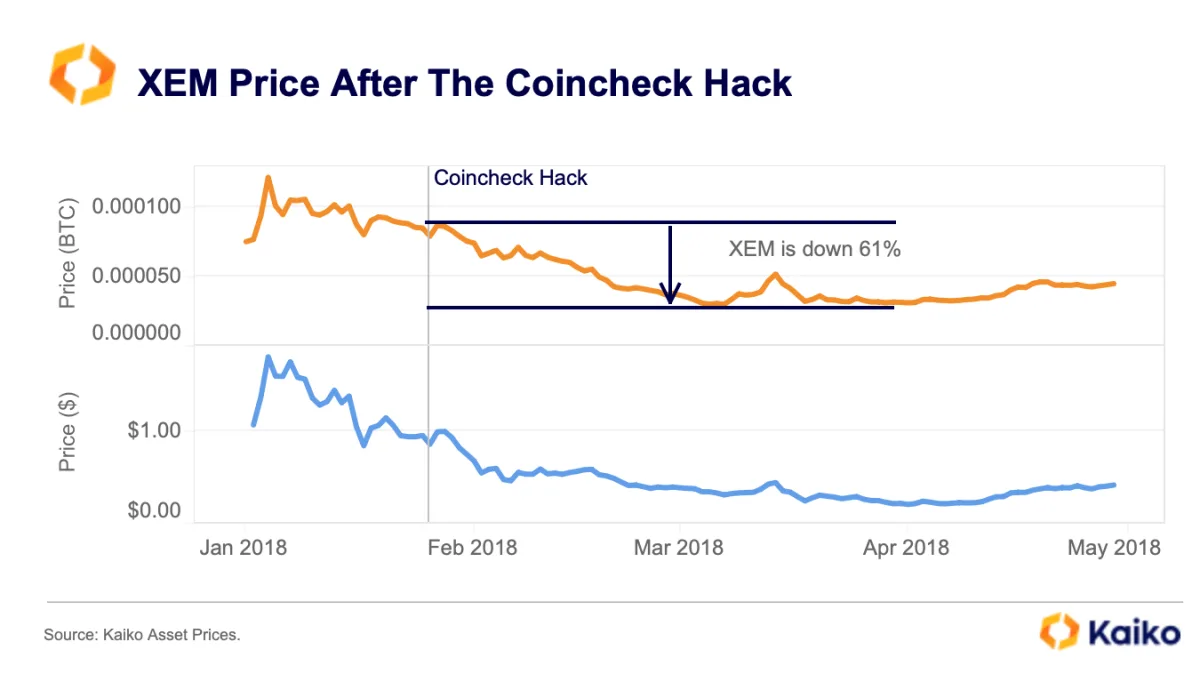
Figure 3: XEM price trend during the Coincheck hack event
Zaif, a smaller exchange, was hacked, resulting in a loss of approximately $60 million.
The Japan Virtual Currency Exchange Association (JVCEA) was established as a government-approved self-regulatory organization to raise industry standards and approve the listing of tokens on exchanges.
The FSA issued business improvement orders to several cryptocurrency exchanges and conducted on-site inspections to ensure compliance with the new regulations.
The FSA limited the leverage for margin trading of cryptocurrencies to four times the deposit amount, aiming to curb speculative trading and protect investors.
Leverage Trading Regulations and Ongoing Development
2019:
Coincheck now complies with the new regulations and has resumed operations.
The Japanese Cabinet approved new regulations, limiting the leverage for margin trading of cryptocurrencies to 2-4 times the initial deposit.
The amended FIEA and PSA came into effect, further tightening regulations on cryptocurrency exchanges and security token offerings (STOs).
2020:
The FSA reduced the maximum leverage ratio for margin trading to 2 times.
Further amended PSA and FIEA were implemented, focusing on enhancing user protection and market integrity.
2021:
Japan continues to develop its regulatory framework, focusing on enhancing investor protection, cybersecurity, and preventing money laundering.
The FSA has established a new regulatory body to oversee cryptocurrency exchange operators and ensure compliance with evolving regulations.
The FSA requires the JVCEA to implement self-regulatory rules, including the "Travel Rule" for information sharing during transactions.
Latest Developments
2022:
The FSA introduced additional guidelines for the custody of digital assets by exchanges, emphasizing the need for robust internal controls and risk management practices.
The JVCEA introduced the Travel Rule in its self-regulatory rules, and the Cabinet Secretariat revised the Act on Prevention of Transfer of Criminal Proceeds (APTCP) to enforce the rule.
The Japan National Tax Agency revised tax laws to exempt token issuers from paying corporate tax on unrealized cryptocurrency gains.
Japan is exploring the potential issuance of a central bank digital currency (CBDC), with the Bank of Japan conducting experiments and research.
The Upper House passed a bill to regulate stablecoins, monitoring money laundering and combating illicit activities.
The Liberal Democratic Party (LDP) Digital Society Promotion Headquarters released the "NFT White Paper: Japan's NFT Strategy in the Web 3.0 Era," proposing policy recommendations for the development and protection of NFTs.
The Ministry of Economy, Trade and Industry (METI) established the Web3 Policy Office to create a supportive business environment for Web3-related industries.
The FSA is working to lift the ban on foreign-issued stablecoins.
2023:
The FSA continues to refine its regulatory approach, focusing on emerging trends such as DeFi and NFTs.
The FSA issued a draft order for public consultation on amending the enforcement order of the APTCP, clarifying the applicability of the Travel Rule to Virtual Asset Service Providers (VASPs) in Japan.
Prime Minister Fumio Kishida emphasized that Web3 is the cornerstone of economic reform, calling it "a new form of capitalism" and highlighting its potential to drive growth by addressing societal issues.
2024:
The JVCEA plans to streamline the listing process for digital currencies, aiming to simplify the approval process for existing tokens in the market.
Certain digital assets are expected to undergo a streamlined pre-approval process for listing on authorized exchanges.
The Cabinet approved a bill allowing investment tools of venture capital companies to directly hold digital assets.
Current Position: Struggling for Web3 Adoption in Japan
Japan's weaknesses in adopting Web3 primarily stem from regulatory constraints, especially in exchange listings and taxation. Exchange listings are subject to strict regulation by the FSA, and local CEXs lack major cryptocurrencies, leading to a lack of liquidity for stablecoins (Figure 4).

Figure 4: Limited product offerings of local CEXs.
Note: We examined the USDT pairs on Binance and ByBit, as they do not offer USD fiat currency.
For ByBit, $SHIB and $BONK are offered in 1000-unit blocks ($1000BONK and $SHIB1000).
Apart from Bitbank offering the most variety of currencies on Japanese exchanges, this reinforces the dominance of major currencies on Japanese exchanges (Figure 5).

Figure 5: Market share of top two assets in Japanese and international CEXs.
Duration: From 2024 to present
Additionally, cryptocurrency gains are considered miscellaneous income and are taxed at the individual income tax level, plus local taxes, with the highest rate reaching 55% (Figure 6).
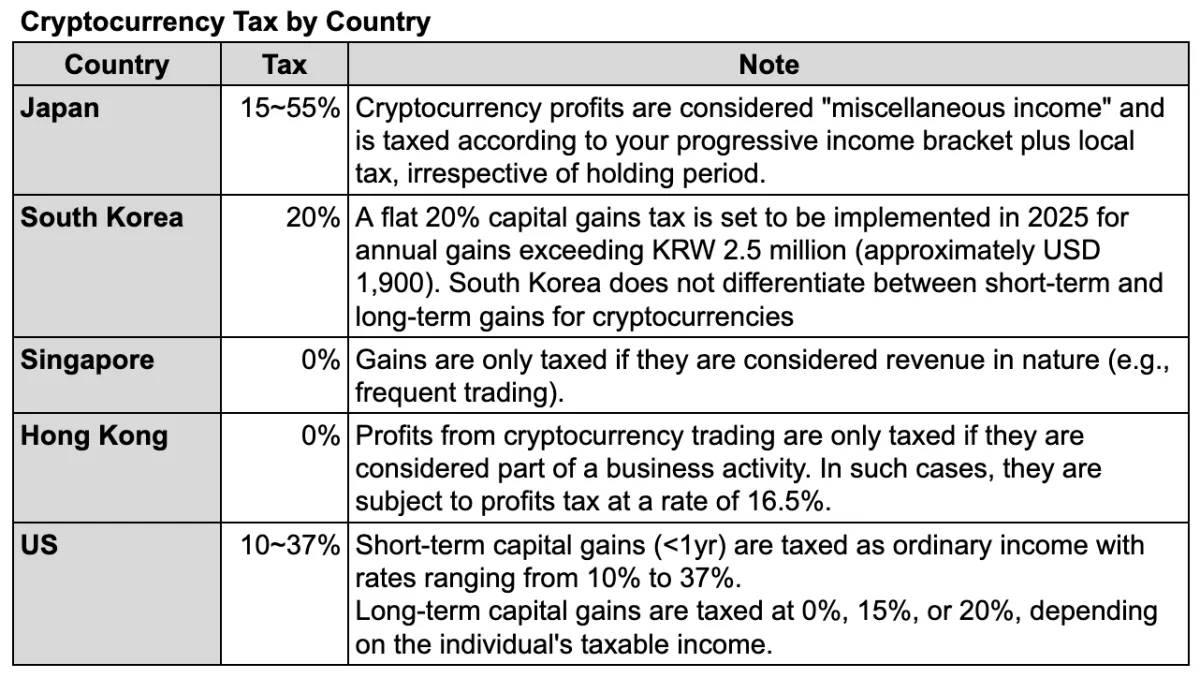
Figure 6: High capital gains tax on cryptocurrencies in Japan.
Before institutional investor involvement, there was a period when JPY trading volume exceeded USD trading volume, but the aforementioned challenges have made the situation difficult.
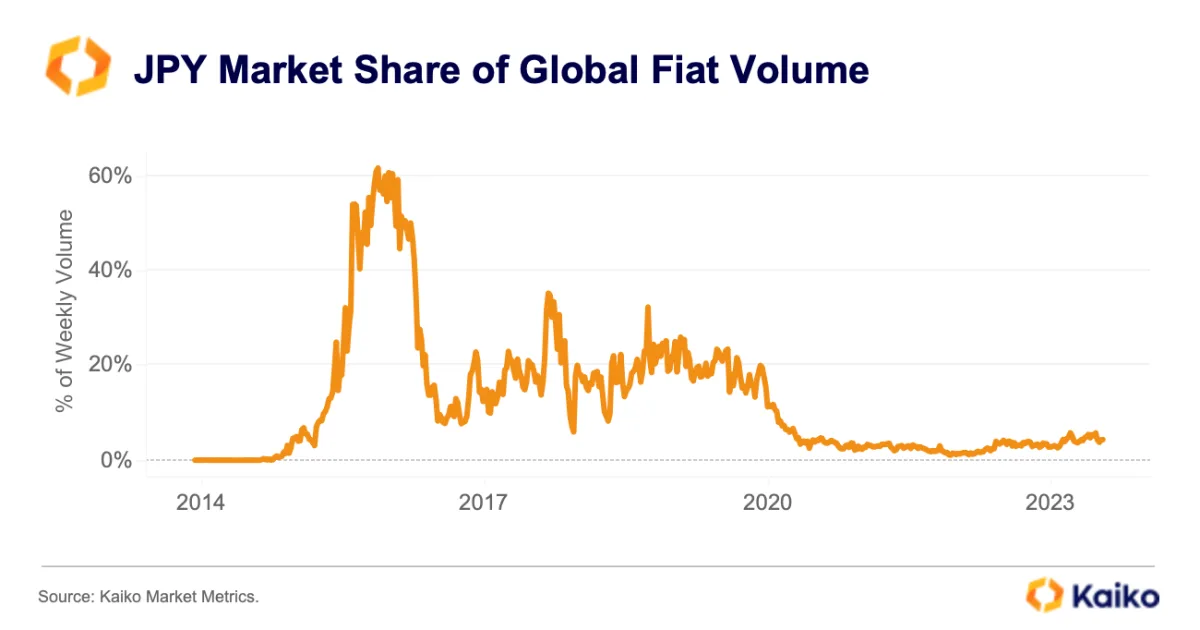
Figure 7: Market share of JPY in global fiat currency trading volume.
The absolute dominance of JPY, accounting for over 60% of all fiat currency trading volume, rapidly disappeared during the pandemic. However, the total share of Asian fiat currency trading volume has remained relatively stable as trading volume shifted from JPY to KRW (Figure 8).
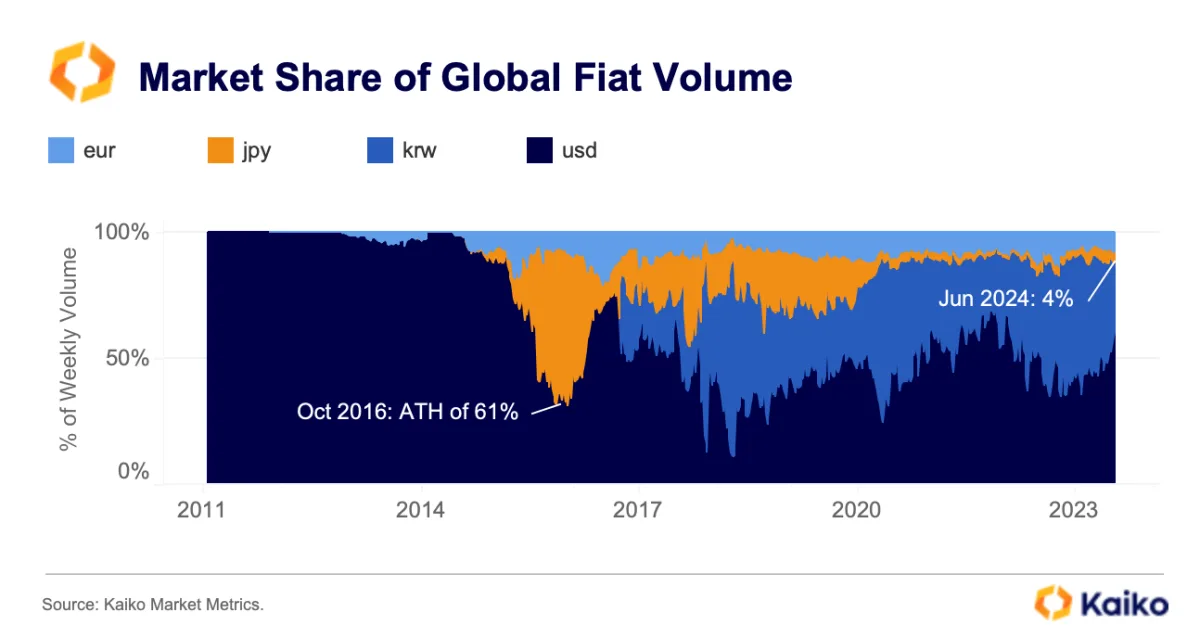
Figure 8: JPY trading volume relative to other currencies.
Interestingly, when we rebase JPY and USD trading volume to the historical peak in November 2021, JPY trading volume shows a stronger recovery in this period (Figure 9).

Figure 9: JPY and USD trading volume rebased to the historical peak in November 2021 = 100.
In terms of institutions, Japan is a content-rich country with companies like SEGA and Kodansha, making it an ideal location for NFT and game-driven projects. In theory, these companies can bring attention, users, research capabilities, and capital, but this strategy has shown minimal effects in any country and has been touted as a bullish case for Japan for many years.
Politically, the ruling party that relaxed regulations recently suffered a defeat in the April 2024 Lower House elections, giving momentum to the opposition Constitutional Democratic Party, which has attracted attention. However, given the continued majority position of the Liberal Democratic Party in both houses of the Diet, and the increasingly fierce international and domestic competition in adopting Web3, we believe these developments are currently not a cause for concern.
Cryptocurrencies face many unfavorable factors, but simply put, many issues are cultural and therefore cannot be quantified, nor are there simple solutions. As an international metropolis, English proficiency is extremely low, inherent entrepreneurial spirit is lacking, stable employment at locally renowned large companies is still seen as the pinnacle of post-graduation employment, the cautious attitude of companies contrasts sharply with the "fast-moving" nature of cryptocurrencies, and so on. All these factors are relative, especially compared to Asian competitors like Singapore and Hong Kong, but many of these factors are also absolute, making the challenges even more difficult. Coupled with challenges in taxation and CEX product supply, it is difficult to imagine Japan's adoption rate catching up quickly with its Asian neighbors.
Key Participants in the Japanese Cryptocurrency Market
i) Centralized Exchanges (CEXs)
As mentioned earlier, Japanese CEXs lack competitiveness in product offerings compared to their international counterparts, and high capital gains tax makes cryptocurrency trading unattractive. These challenges are reflected in the trading volumes of domestic exchanges, and the user interface and experience (UI/UX) of these exchanges also lag behind foreign competitors.
Currently, Japan has 29 registered cryptocurrency exchange service providers with the Financial Services Agency (FSA). We illustrate the current market landscape through charts.

Figure 10: Market share of centralized exchanges in Japan
However, domestic exchange trading volumes in Japan are almost non-competitive compared to top international exchanges. Since the COVID-19 pandemic, Binance has significantly outpaced Japanese exchanges.
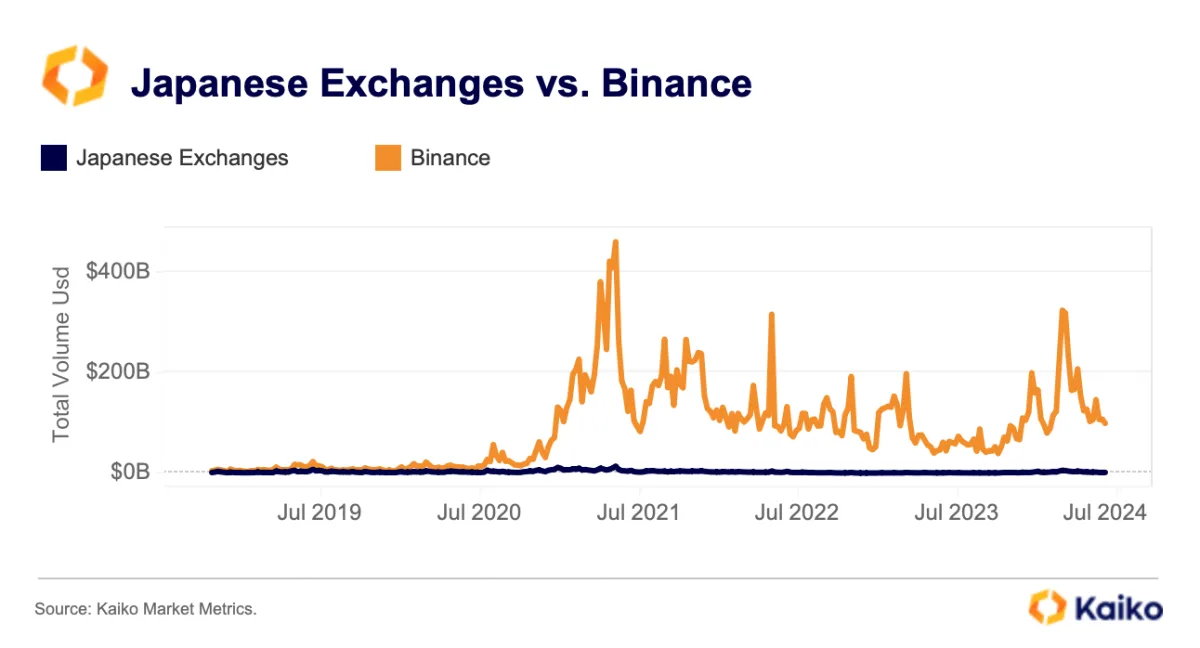
Figure 11: Comparison of total spot trading volumes of Japanese exchanges with Binance
This difference can also be observed when comparing the depth of the BTC order book on spot exchanges.
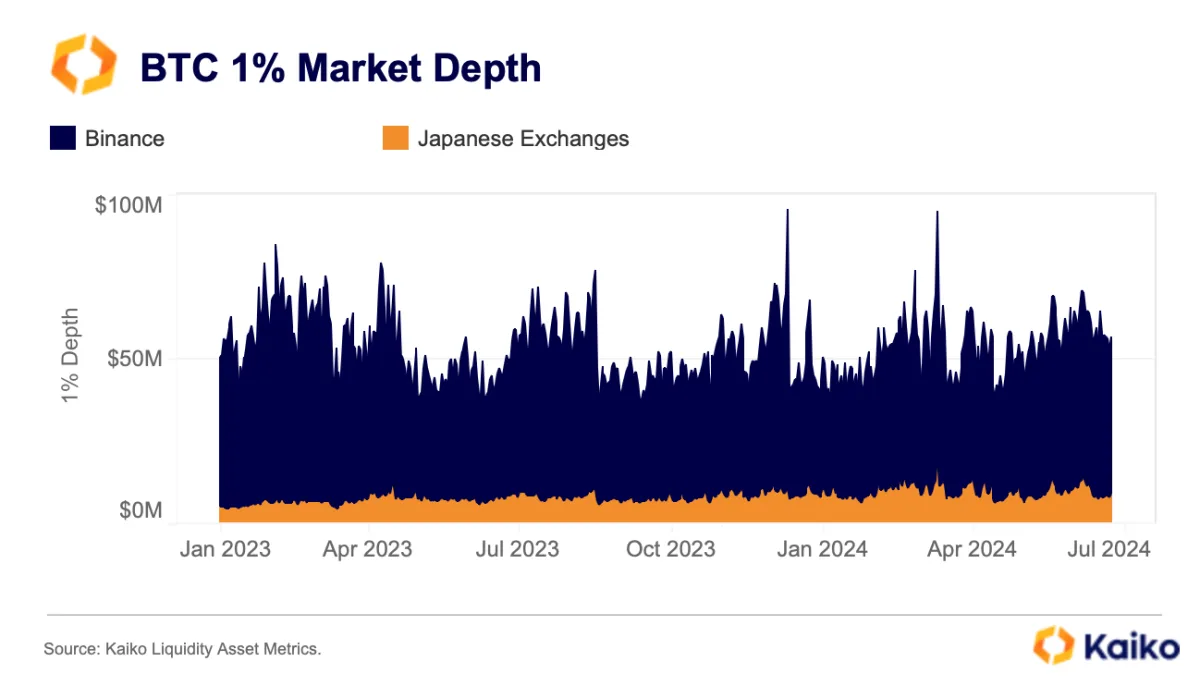
Figure 12: Comparison of 1% depth of the spot BTC order book between Japanese exchanges and Binance
ii) Investment Groups:
SBI Digital
SBI Holdings (TYO: 8473) is a Tokyo-based financial services group founded in 1999. Initially part of the SoftBank Group, it became independent in 2000. SBI Holdings operates in multiple areas, including financial services, asset management, and biotechnology. It is known for integrating technology with traditional financial services to drive innovation and growth.
SBI Digital Asset Holdings is a subsidiary of SBI Holdings, focusing on digital assets and blockchain technology, and is the largest cryptocurrency investment group in Japan. SBI Digital was launched in 2020 with the aim of fundamentally transforming the traditional financial industry by providing comprehensive solutions such as digital asset trading, token issuance, and custody services. They provide a secure platform for various digital asset transactions and facilitate token issuance, enabling businesses to raise funds through innovative methods such as Security Token Offerings (STOs). Their custody services ensure the secure storage and management of digital assets, utilizing advanced security measures to protect investments. SBI Digital also collaborates with global financial institutions, such as jointly establishing a crypto risk fund in Singapore with SIX Digital Exchange, aimed at increasing liquidity and infrastructure for digital assets across Asia and Europe. Another significant initiative is the Digital Space Fund launched in 2023, with a fund size of up to $660 million, focusing on Web3, Metaverse, artificial intelligence, fintech, and other emerging technologies.
SBI offers a variety of services in both traditional finance and the crypto space, including custody solutions and market-making services through its subsidiary B2C2.
iii) Protocols/Projects:
Astar Network
Astar Network is a decentralized application (dApp) platform built on the Polkadot ecosystem and is one of the most important crypto projects in Japan (although its headquarters are not in Japan, but in Singapore). It was founded by well-known figures in the Japanese blockchain industry, including Sota Watanabe. Astar aims to provide developers with a scalable, interoperable, and decentralized network to deploy their applications. The network supports multiple virtual machines, including the Ethereum Virtual Machine (EVM) and WebAssembly (WASM), allowing developers to write smart contracts in various programming languages.
Astar Network is a decentralized application (dApp) platform built on the Polkadot ecosystem. While Astar is one of the leading crypto projects in Japan, its headquarters are in Singapore. Founded by prominent figures in the Japanese blockchain industry, such as Sota Watanabe, the platform aims to provide a scalable, interoperable, and decentralized application deployment platform for developers. Astar supports multiple virtual machines, including the Ethereum Virtual Machine (EVM) and WebAssembly (WASM), allowing developers to write smart contracts in multiple programming languages.
Astar facilitates dApp development and drives innovation in decentralized finance (DeFi), non-fungible tokens (NFTs), and other blockchain applications by providing necessary tools and infrastructure. Its integration with Polkadot enhances its interoperability with other blockchains, making it an integral part of the blockchain ecosystem.
Astar is significant in Japan as one of the country's leading blockchain projects, demonstrating the interest and investment of the Japanese tech industry in blockchain technology. However, activity on Astar is still in its early stages: Figure 13 shows the Total Value Locked (TVL) in USD, and Figure 14 compares its TVL in native tokens ($ASTR and $SOL) with Solana's TVL, with January 23 as the baseline.

Figure 13: Comparison of Astar's USD TVL with larger chains
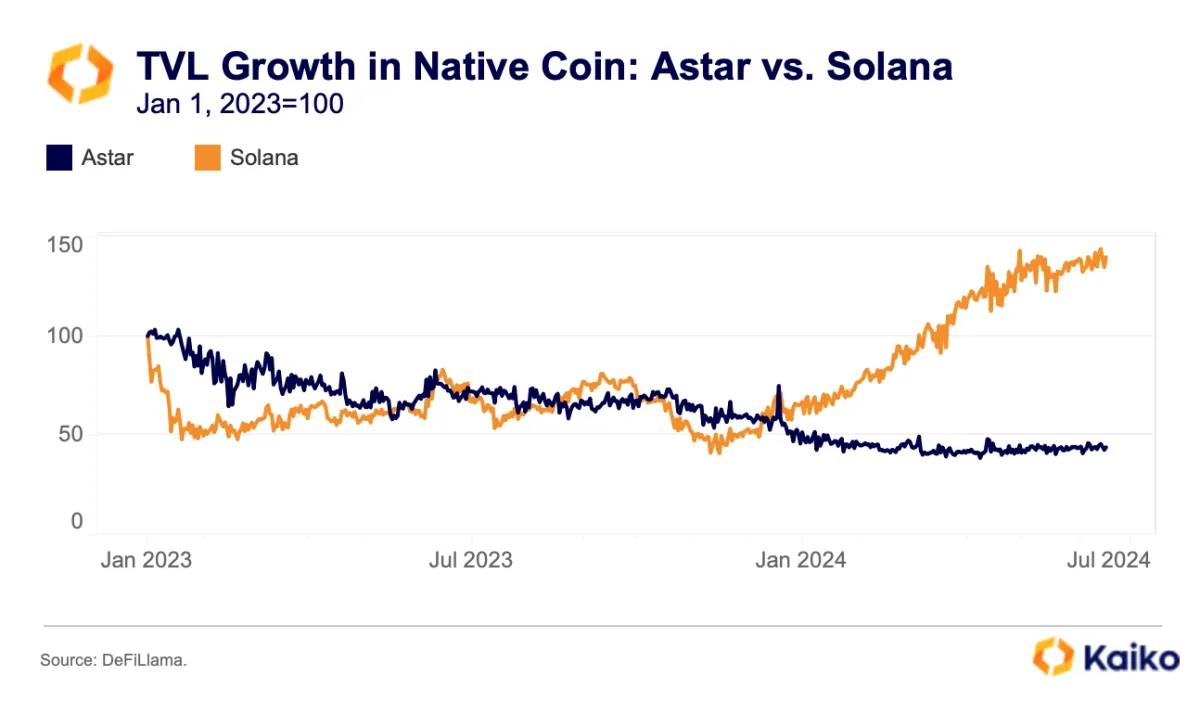
Figure 14: Comparison of Astar's TVL with Solana's TVL, calculated in its native tokens ($ASTR and $SOL), with January 23 as the baseline
Backpack
Backpack is one of the most exciting wallet providers in recent years. Their non-custodial wallet currently supports Solana, Ethereum, and Arbitrum, offering browser extensions as well as iOS and Android applications. Interestingly, the company was founded by two non-Japanese founders who chose Tokyo as their headquarters. We interviewed Tristan Yver, co-founder of Backpack, to discuss why they chose to establish the company in Japan:
Who are you, and what is Backpack?
I am Tristan Yver, co-founder of Backpack. Backpack is a cryptocurrency wallet designed to manage all crypto assets securely and user-friendly. I am also one of the founders of the Mad Lads NFT collection, a leading NFT collection on Solana and one of the strongest communities in the crypto space.
Why did you choose Japan as your headquarters location?
We chose to establish our headquarters in Japan because the regulatory environment here is gradually improving, and we have a local team stationed here. Among all the countries in Asia, Japan is the place where our team most wanted to establish our headquarters because of its high level of security and quality of life. We are also committed to promoting Japan as a thriving Web3 country and inviting other founders and teams to visit us.
What changes do you think need to be made domestically to increase cryptocurrency adoption?
To drive cryptocurrency adoption in Japan, more resources need to be available for engineers to learn blockchain programming, and the entrepreneurial sector needs to recognize the huge opportunities in the Web3 space. I also believe that a more favorable tax policy would attract more individual investors to participate in the crypto market.
Can you introduce the upcoming updates from Backpack?
We are excited to add more blockchain support to the Backpack wallet. Starting with Solana and Ethereum, we now support Arbitrum and will soon support Base, Optimism, and Polygon. These innovations are aimed at providing users with the best non-custodial crypto management experience.
Closing Remarks
Although Japan had an early start in terms of applications for ordinary users, factors such as regulatory scrutiny following exchange hacking incidents, high taxes, limited coin offerings by exchanges, and cultural barriers have left Japan far behind its Asian counterparts in the Web3 space. The current government led by the Liberal Democratic Party, under Prime Minister Kishida, is looking in the right direction, but progress is slow. The activities of local exchanges reflect this struggle, and it is currently difficult to see any catalyst that can change Japan's decline. However, the comprehensive regulatory environment and the lifestyle factors such as security and quality of life mentioned by Tristan continue to make Japan an attractive place to live, as seen in the case of Backpack, where talented individuals may choose Japan as their operational base.
Join the official TechFlow community
Telegram subscription group:
Official Twitter account:
English Twitter account:
免责声明:本文章仅代表作者个人观点,不代表本平台的立场和观点。本文章仅供信息分享,不构成对任何人的任何投资建议。用户与作者之间的任何争议,与本平台无关。如网页中刊载的文章或图片涉及侵权,请提供相关的权利证明和身份证明发送邮件到support@aicoin.com,本平台相关工作人员将会进行核查。




